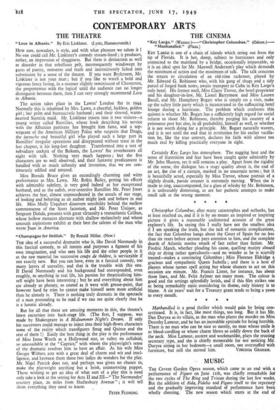THE CINEMA
"Key Largo." (Warner.)—" Christopher Columbus." (Odeon.)-- " Manhandled." (Plaza.)
KEY LARGO is one of a chain of islands which string out from the tip of Florida. It is hot, damp, subject to hurricanes and only connected to the mainland by a bridge, occasionally impassable, so it is an ideal spot for Mr. Maxwell Anderson's play which demands the minimum of action and the maximum of talk. The talk concerns the return to circulation of an old-time racketeer, played by Mr. Edward G. Robinson who, with his gang of thugs and a tidy parcel of forged bank notes, awaits transport to Cuba in Key Largo's only hotel. His former moll, Miss Claire Trevor, the hotel proprietor and his daughter-in-law' Mr. Lionel Barrymore and Miss Lauren Bacall, and Mr. Humphrey Bogart who is simply on a visit, make up the sultry little party which is incarcerated in the suffocating hotel lounge during a hurricane. The problem which confronts this quintet is whether Mr. Bogart has a sufficiently high regard for social reform to shoot Mr. Robinson, thereby purging his country of a poisonous pest but also, in all probability, himself as well, or whether it is not worth dying for a principle. Mr. Bogart naturally wavers, and it is not until the end that in restitution for his earlier vacilla- tion he, like the true convert, declares his faith with almost too much zeal by killing practically everyone in sight.
Certainly Key Largo has atmosphere. The nagging heat and the Sense of frustration and fear have been caught quite admirably by Mr. John Huston, yet it still remains a play. Apart from the rigidity of the scene, the dialogue has a stagy quality about it, the end of an act, the rise of a curtain, marked in no uncertain terms ; but it is beautifully acted, especially by Miss Trevor, whose portrait of a slightly drunk, passee crooner is extremely moving. When she is made to sing, unaccompanied, for a glass of whisky by Mr. Robinson, it is unbearably distressing, as are her pathetic attempts to make small talk at the wrong moment.
Christopher Columbus, after many catastrophes and setbacks, has at least reached us, and if it is by no means an inspired or inspiring picture it gives a reasonable undistorted account of the great explorer's life. In saying this I really have not the smallest idea if I am speaking the truth, but the lack of romantic complications, the fact that Columbus hangs about the Court of Spain for no less than six years before anyone pays attention to him, and the complete dearth of Atlantic storms smack of fact rather than fiction. Mi. Fredric March, whether pleading his cause, quelling mutiny aboard ship or dying rather querulously—and no wonder as he is scurvily treated—makes a convincing Columbus ; Miss Florence Eldridge a gracious and sympathetic Queen Isabella ; and there is a host of players whose names spell acting but whose chances to act on this occasion are minute. Mr. Francis Lister, for instance, has about three lines, and Mr. Felix Aylmer not many more. The colour is good and the settings splendidly lavish, and if this film strikes one as being remarkably static considering its theme, only history is to blame. A six years' wait for a Treasury grant tends to bring a yawn to every mouth.
* * * *
Manhandled is a good thriller which would gain by being con- certinaed. It is, in fact, like most things, too long. But it has Mr. Dan Duryea as its villain, as the man who plants the murder on Miss Dorothy Lamour, and he has an incredible aptitude for being horrible. There is no man who can be nice so nastily, no man whose smile is as blood-curdling or whose charm blows- so coldly down the back of the neck. Miss Lamour, austere and workmanlike, plays the trusting secretary type, and she is chiefly memorable for not noticing Mr. Duryea sitting in her bedroom—a small room, not overstuffed with furniture, but still she missed him. VIRGINIA GRAHAM.






































 Previous page
Previous page